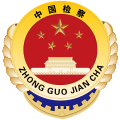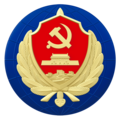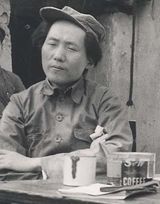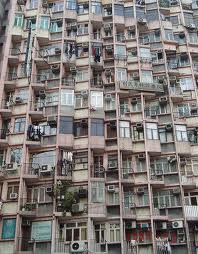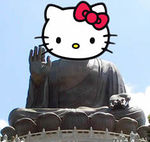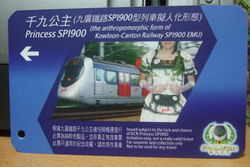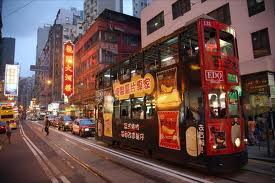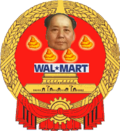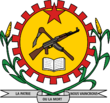Hong Kong
| |||||
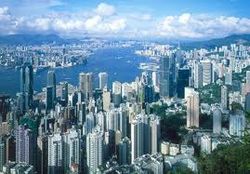
| |||||
| Motto: Diu Gau Lan Tsat Hai Nei Lou Mou | |||||
| Anthem: "God save | |||||
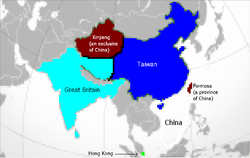
| |||||
| Established (British) | 1898, by serial bullying | ||||
| Established (PRC) | 1997, by serial bullying | ||||
| Government | A pack of fools | ||||
| General Secretary | Xi Jinping | ||||
| Queen | Maggie Thatcher | ||||
| Puppet King | The Chief Executive (Newspeak: Exechief) | ||||
| Official language | Cantonese; Newspeak; smatterings of English | ||||
| Currency | Joss papers, as those used in ancestral worship | ||||
| Area | Too small | ||||
| Population | Too large | ||||
| Religion (official) | Hello Kitty | ||||
| Religion (unofficial) | Baseless optimism | ||||
| Exports | Migrants, martial artists, and Ipods | ||||
| Imports | Migrants, WTO protesters, fatal diseases | ||||
“Don't jump onto train tracks as you may cause another transport merger.”
“It's time to get your umbrellas out!”
Hong Kong, officially Foreign Hong Kong (Chinese: 國外香港), is foreign to China, foreign to Great Britain, and foreign to TaiwanChinese Taipei. However, Hong Kong people had admitted that they are a part of the part of Titan (moon of Saturn) occupied by either China or the rebellious government on Chinese Taipei.
Hong Kong, which in Chinese translates to "fragrant harbour" (in English and Japanese it translates to Fantasy Island, and yes, Tattoo, "de plane" is coming."), is the dystopian world that George Orwell wrote about in 1997, his acclaimed prequel to his long-forgotten 1984.
Hong Kong residents — known as "Hong Kongers", "Hongkongese", "Hong Kongentals", "Hong Cucks" or just simply "honkies" — are a special race with utterly no national identity apart from morphing into the identity of whomever currently occupies their city. For example, when this author arrived in Hong Kong, it transformed into 'Bill Maher Land of the Un-Funny.'
History, "Faat Sung Yeh"[edit | edit source]
Qing gets pwned[edit | edit source]
Once upon a time, right around the end of the Qing dynasty, China was occupied by eight different foreign powers. This revealed two traits that continue to define Hong Kong:
- Visceral resentment of domination from without, and
- Utter inability to do anything about it.
Some of the bizzare cultural attributes of that era, such as Death worship and putting chopsticks up your nose to see where they come out, now find an outlet only among Emos.
A group then emerged calling itself the Fists of Peace. But despite the name, it was just as much a terrorist group as Hamas, al-Qaeda, or KFC. They ran amok, killing and burning anything foreign: embassies, churches, drive-thru car washes, what-have-you. When the joint forces of the occupiers marched into the streets, however, these Fists lost a giant game of rock-paper-scissors.
Later, British merchants (what we'd now call multi-nationals) rolled out a new product called opium. The Qing dynasty banned it, seized tons of it, and was seldom seen outside of a sweet-smelling haze of smoke. But the Qing's had bitten off more than they could chew, and Britain bit off the island of Hong Kong. China threw in Kowloon (the adjacent real estate on the mainland), but only for a limited, 99-year free trial.
Rise of Maoism[edit | edit source]
Chairman Mao looked around one day and got the notion to be a dictator. He talked his Berkeley buddies and some cool cats who loved radical big band music into giving him a hand in a Communist revolt. As World War II ended, Mao and his friends assaulted the exhausted Chinese government and came to power.
What does this have to do with Hong Kong? Nothing. It was still occupied by the British. And no one wanted to jump out of the frying pan and into the fire. Of course, he dis-admitted the legalality of the other treatments except Hong Kong and the next island over, but that doesn't help.
But when violence almost overthrew the next island over, Hong Kong Communists rioted against everything British: colonialism, perfume, long boring movies, powdered wigs, and even scones. Mainland China suggested it might just get off its couch and put an end to the strife, and that's when Britain started to get cold feet over the entire "empire" thing.
The "handover"[edit | edit source]
A century of being merely the shiniest toy in the toy-box of the British Royalty was slavery, but happily, the foreign masters didn't care which businessmen won and lost. You could ask for a competitor to be shut down, but the occupiers would just say "Meh! You both look alike to us!"
Then, perhaps dismayed by the cost of actually defending an island colony, a Prime Minister known as the Iron Lady went back to her ironing, agreeing not just to give back Kowloon at the end of its 99-year lease, but to give back everything else.
Its easy to think she just caved in, but she did hand to the Chinese an impossible task that everyone else would regard as extortionate: reduce the credibility of the BBC, but only if they overplayed their chances. The Chinese could not refuse, because here was take it or leave it. No one really thought that the Chinese needed to step up to the challange, but its easy to be proven wrong. A housewife from Somerset disliked that Britain had reduced inflation, and the BBC made everyone think that reduced inflation is just bad. The housewife also disliked that Safeway set up a new shop in Somerset, and the Beeb held Thatcher responsible. Thatcher would phone the Chinese, but they confirmed that this is where they need to put in for their part of the deal.
The obligation conserning China was a secret, but it had to be dealt with, however unlikely it was that BBC would overplay their prestige. They did not have an idea on how to carry out anything, but they could train on something simular, but relatively easy: Make Paul McKartney seem like a toryvoter. How is that done? If a band in Manchester is filled with what might be commies, boost the career of the singer. His name was Alfred Lord Tennyson....so be it. The BBC were not affected, but they knew they were in for a ride. Someone learned the name of the least funny person in Wales, and planted him in the BBC. The editorial board were forced to pretend he was funny. Margareth Thatcher was easily amused by Keith Allen, but only if he was with the BBC.
The BBC was the actual reason that Britain had reduced inflation. The Beeb was a tool for bullying the Chinese in to doing things they actualy did more of. The Chinese had done thier part of the bargain, but for good meassure they told Rupert Murdoch to by paparazzi-pictures my the millions. Never the less, june of 1997 came and went. After a brief transition, with dual passports that let the white folks "return" to the U.K., "handover"—or is it hold-up?—was complete and everyone in Britain felt really clean for a few days. Not known to anyone, but the BBC are the real losers in the game about
The protests[edit | edit source]
However, after the handover, the Hong Kongers are still unhappy with Hong Kong going to China on the grounds of 'erosion of democracy, rising costs of living and so on'. Basically, overnight, after the process known as the 'handover', Hong Kong has turned from British hell to Chinese hell. Their troubles are not yet over with the disappearance of a few people (which turned up for some reason on the mainland), random people marching in the streets and the emergence of a zombie virus known as SARS.
These are just the tip of the iceberg. What has pushed Hong Kong from Hell to Hell of protests is because of the controversial extradition bill puppet queen Carrie Lamb decided to pass after a Chinese-Taipeian committed mass murder somewhere in Hong Kong (seen every day). Since then, weather reports in Hong Kong includes chants of 'greater democracy' and a lot of bullshit, which is just a cover for western powers to take back Hong Kong from China.
Basically, a version of the Tiananmen protests which did not happen.
The 'National Security' Law[edit | edit source]
On June 30 2020, the local government imposed the 'Law of the People's Republic of China on Safeguarding National Security in the Hong Kong Special Administrative Region' as a direct result of protests foreign influence influencing the vunerable people of Hong Kong. The law seeks to do the following :
- To 'safeguard National Security';
- To
create a police staterestore law and order, granting police more power; - To
opressprotect the proud citizens of Hong Kong from 'terrorists' (none); and - To prevent 'secession' to other governing parties, 'collusion' with foreign forces and 'subversion'.
Many inhabitants feel that the law is an attack on their rights nessesary in order to shut the protests in Hong Kong, orchestrated by the majority of citizens the CIA to create instability. Under this law, two news agencies which "colluded" with foreign forces and inciting a terrorist movement which seeks for democracy. Many others were also arrested for allegedly breaking the law. The government has been accused praised for abusing using the law to arrest pro-democracy figures peaceful protesters radical revolutionaries which seeked to overthrow the government.
And if that wasn't enough, we'll just deport them to China!
Politics and government, "Mouh Jouh Yeh Yahn"[edit | edit source]
“One country, two cisterns”
When the handover took effect in 1997, China had to promise to preserve Hong Kong's "system" for fifty years. As so often happens: one side gets the land and the other side gets the words. No one knows what "system" the Chinese meant(yet only Chinese people know and is a secret), but it probably means the "system" of 7-11 stores with smokes and Daily Mirrors. Hong Kong became a Special Adminstrative Region (or SARS), a blissful free spirit on the underside of China's thumb.
China appointed a figurehead, three-person Chief Executive to keep the welfare of Hongkongers in mind--whenever it makes decisions that undercut them. It has the Orwellian abbreviation ExeChief. The first ExeChief comprised a primate as smart as Bush, a duck (fluent in duckspeak), and a puppet king. There is also a Legislative Council, or LegCo, but its main fuction is to play with LegCo bricks while keeping one eye closed and its nose out of anyone's business.
Mr. Tung's signature innovation addressed the financial hardship of home ownership by flooding the market with 85,000 government-built housing units. This instantly slashed Hongkongers' home equity while leaving their monthly payments unchanged, and gave new meaning to the words "There goes the neighborhood."
Mr. Tung resigned in 2005 "for health reasons" (the inhabitants got sick of him). He was replaced by administrator Donald Tsang, who vowed to enact Tung's policies to the letter, as when an exciting movie sequel turns out to be the same as the original. However, since Mr. Tsang's elevation, no one in the city has referred to Mr. Tung as "a horrible leader"--just as no one continued to lament the "awful British occupation" once the Communists took over.
Geography, "Dei Fong Yeh"[edit | edit source]
Hong Kong is basically a few pieces of land with rock masses scattered around them, held together by seawater and sky. The land and rock masses are nothing of importance, but fundamentally scarce, which keeps the land price sky-high and gives real-estate developers an excuse to charge a fortune for a flat made out of cardboard.
Hong Kong has a strategic location downwind from the savoury aroma of thousands of Chinese smokestacks.
Economy, "Faai Di Noh Chin, Woh!"[edit | edit source]
Hong Kong is proudly famous as "the freest nation in the world," despite the minor quibbles that (1) it isn't free and (2) it isn't a nation. The Hong Kong economy has worldwide renown for two reasons:
- The misimpression that Hong Kong offers unrestrained laissez-faire capitalism, and
- The fact that Hong Kong residents still work for Third-World wages.
Government continues trying to solve the second "problem," but Hong Kong still offers astonishing bargains for skilled handwork like tailored suits--at a time when most everyone buys sweatshirts at Wal-Mart stamped out by the other slaves on the mainland.
But there is now a Disneyland.
- Residences
There are no actual homes in Hong Kong, only self-storage units where residents store themselves and a few belongings. Residents spend half their lives paying for their container. Most of the structures that tourists interpret as walls are actually rows of these containers, where residents are stacked up like cremation urns in a cinerarium.
Paying for space for themselves in an actual cinerarium is how Hong Kong residents spend the other half of their lives.
People, "Yahn Deih, Yau Di Haaih, Jeh!"[edit | edit source]
In past centuries, ugly and fat white men who were underendowed (except financially) married Hong Kong Chinese women. The wives could support the extended family and the man got to have sex in a manner relatively free of disease and greasefat. In modern times, Hong Kong women have moved up the economic "food chain" and Filipinos have taken their place in this symbiosis of sexual imperialism.
Westerners and confused, fake-Chinese racists often consider modern Hong Kongese women more attractive than their counterparts in mainland China. They are seen as cute, having good taste in everything, and indifferent to expatriate gropers from the Far West.
Language[edit | edit source]
As Hong Kong was Britain's bitch for a century, English plays a key role. Children study English in kindergarten and most continue the study it for 20 years--solely in case some distant, white relative might have left a will, or to write Software User Manuals. And bugger all good it does them! The staff at the front desk of most hotels will really try to speak English, but the only way to eat well is to point and grunt at the plate in front of some other diner.
Religion[edit | edit source]
Hong Kong was home to many diverse religions, such as Falun Gong and Yoga. In 2007, however, the government decreed that only the city's most popular religion would be allowed. Consequently, most residents now worship Hello Kitty. They have the dippy little diaries (with lock and key that thwarts everyone who has never heard of scissors) and many actually own a cat, and have a cat bathroom in their house, a cat delicatessen in their tiny refrigerator, and a cat habitat taking up precious space in what passes for a living room. Some cats enjoy walking in the open air--but none enjoy it enough to descend fifteen flights of stairs.
Widespread adoption of religion has not rekindled the birth rate. Not even official ridicule of Brokeback Mountain did that. The birth rate is dropping so fast that by 2021, half of Hong Kong Chinese will have an Indonesian maid as one or both parents, whether they know it or not.
Fashion[edit | edit source]
The latest Hong Kong fashion is called "MK." In this absurd trend, bi-sexual young men groom their hair in a combination mullet/combover, dress and apply make-up to imitate both hedgehogs and pubic hair, and chain-smoke even if they hate tobacco. They wear tight, dark-coloured trousers, numerous small silver necklaces, earrings, and bracelets, a fake leather jacket, and most importantly, a black shirt with white-lettered English slogans that don't make any sense. This style suggests a continuing love of things foreign. Strangely, no foreigner is imitating "MK."
Culture[edit | edit source]
There is theater, opera, and dance in Hong Kong--just as there are photos of Hong Kong in Chinese restaurants in other countries. Again, everyone admires foreign stuff. But there is only one authentic Hong Kong culture: Martial arts. From Bruce Lee to Jackie Chan, the archetypal Hong Kong hero is a bare-chested high-jumping fighting machine, singlehandidly holding six pistol-armed attackers at bay with a single broomstick, changing positions second-by-second (mostly with back-flips) as his adversaries freeze in amazement, leaping in ways that are impossible on any planet with gravity, and flinging Ninja wheels and firebrands with perfect accuracy, all while showing no fatigue in three hours of hand-to-hand combat.
Although residents occasionally try to find real-world applications of their fantasy view of themselves as martial artists — notably, at LegCo meetings — its main application is to convince themselves that they have untapped genetic prowess despite two centuries of complete domination by whatever foreigners happened to wander into the vicinity.
The mansion where Mr. Lee lived is open to visitors despite claims of bad fung shui and Fu Sheng. Red-blooded young men are especially welcome at this hospitality center. The mansion had been bought and donated to the government for conversion to a Bruce Lee Museum, but officials are loath to disrupt a thriving business.
Transport, "Che Tung Haang Gaai"[edit | edit source]
Airports, "Fei Gei Cheung, Hou Mohng Dei Fong, La!"[edit | edit source]
- Kai Tak
Kowloon's Kai Tak airport was fun for everyone. Pilots dove steeply to avoid the skyscrapers and grab enough of the runway to stop before reaching the end Passengers were terrified both at the proximity to the buildings and at the G-forces as the pilot pulled up. But voyeurs among them got to see actual women's underwear hung out to dry from the windows. And residents got practice speaking forcefully by the incessant roar of jets.
The Japanese adapted the Kai Tak concept but called it kamikaze and did not always manage the pull-up maneuver. Kai Tak remains one of the most popular levels in Microsoft Flight Simulator and accounts for most of the ruined keyboards and broken game-port yokes.
- Chek Lap Kok
The new airport at Chek Lap Kok is full of steel and glass as the jet-setter expects. It replaced wildlife habitat and lush tropical jungle that simply wasn't making anyone any money. The only drawback is that it is out in the middle of nowhere. But the traveler, having paid suddenly higher air fares for the use of a modern airport, certainly has some cash left over for a taxi ride he never used to need. Clever, ain't it?
Metro (Subway)[edit | edit source]
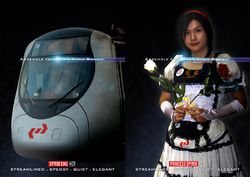
The subway is called Metro Hong Kong, but its official name is the Mass Tabasco Rob (MTR). There was also the Kidding, Can't Run! (KCR) until 2007, the year of the Great KCR-MTR Merge (merged with www.mtr-merver.com).
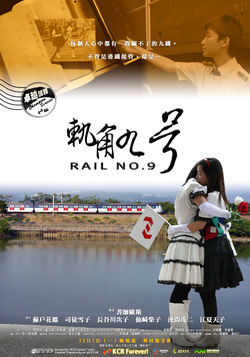
- Method of payment
The Metro uses pre-paid magnetic cards. For some ceremonial cards (pictured), the turnstile spits them back to the customer even when there are no funds left on the card. The Metro calls this a "free souvenir," but riders who live on the top floor of a building instead use them as shingles. This one gives extra help to the amateur carpenter, as it has a hole through which to thread the roofing nail.
- Paperless transactions
Most Hong Kong men spend their days in the Chinese city of Shenzhen or in Macau SAR, and get cheap, lunchtime massages from local working girls, easily returning from these cities to sleep in their own beds. With their own wives. As this travel and commerce is vital to the economies of these cities, Macau, Shenzhen, and Hong Kong designed the "Tentacle Rape" transit ticket with a microprocessor and RFID, which eliminates any paper trail of the journey. Never before have competing governments worked so closely in the joint pursuit of covering up sin. The cardholder is still responsible for his own lipstick stains.
Trolley[edit | edit source]
People who happen to be in Wan Chai can take a quaint double-decker trolley on a circular route. One complete circuit is exactly enough time to finish a Slurpee while avoiding a headache. Fellow passengers have apparent lung disease or are traveling with live chickens or soiled diapers, but you may strike up conversations in English on the trolley, because there is simply so much time to kill. You can tour this one neighborhood at 10 miles per hour and pretend you were back in the time where everything you needed was right here. In modern Hong Kong, nothing you need is on the trolley line.
Ferry[edit | edit source]
A ferry crosses Hong Kong Harbour to a part of Victoria Island reassuringly called The Admiralty. It is neither overloaded nor piloted recklessly--like the third-world ferries you always read about that capsize and kill all the passengers. But you will be thinking about them.
Another ferry goes to Macau. The tourist can waste two hours here, after wasting two days completing visa requirements, to go from an island where everyone speaks a strange language, to an island where everyone speaks a different strange language. But you can gamble and there is chourizo.
Taxis[edit | edit source]
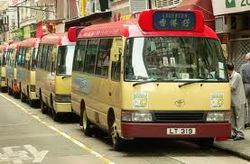
In Hong Kong, every taxi is red, and every red vehicle is for hire. This convention is lost on Americans, who demand to rent red sports cars at the airport. This explains why people are always jumping in front of your car and letting themselves into your back seat when you stop.
Tourists guiding a taxi driver to a desired destination are helped by the ease of remembering many of the city's place names. For example, the Anne Black YWCA is located on 5 Man Fuk Road.
CATHAY PACIFIC[edit | edit source]
Minibus[edit | edit source]
The minibus is the fastest method of public transport--and most have a huge, digital speedometer so the passengers never forget it. But the modest minibus drivers usually cover the speedometer with devotional materials or the newspaper. This preserves the passengers' calm, especially when that 1 in the hundreds' digit lights up.
Famous Hongkongers "Heung Gong Yauh Meng Chi-Sihn Yahn"[edit | edit source]
Hong Kong has bestowed many gifts on the world, including:
- Confusion
- Jackie Chan
- William Hung
- Bruce Lee
- HMS Junk Man
- King Kong
- Donkey Kong
- Kong's Strawberry Queen
- Viet Kong (King Kong's half-wit brother)
- Wu Kong (King Kong's ancestor)
- Hong Kong Phooey (Cartoon Dog Superhero)
